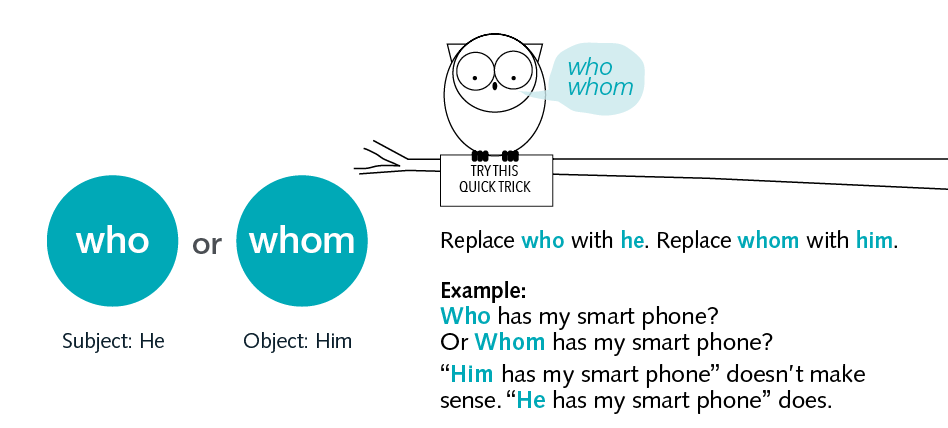In informal writing, we don’t have to worry about the difference as it’s perfectly acceptable to use who. For formal and business writing it comes in handy to know the difference.

When to use who
If you can replace the word with ‘he’ or ‘she’ then use who.
Example: It is written by a practicing manager and entrepreneur who knows firsthand how painful it can be to start and manage a business. (She knows firsthand.)
When to use whom
If you can replace the word with “him” or “her,” use whom. Who should be used to refer to the subject of a sentence. There are some more complex situations involving ‘they’ which I’ll address in a moment.
Example: He is the consultant whom we contacted for feedback on the project with the compamy Analytica. (We contacted him.)
The grammar bit
According to strict grammar rules, we use who to replace a subject (he/she) in a sentence, and whom to replace an object, and after a preposition (after, in, to, on, and with)
Example: I’m going with Roger, with whom are you going?
Of course, we no longer speak like this, so ‘Who are you going with?’ will suffice… Unless you are having lunch with the queen.

What about more complex sentences in formal writing? Consider this example:
Philip has strongly berated Paul [who/whom] has enjoyed hurling mud pies in business meetings.
Should it be who or whom?
A simple trick is to think about what the replacement represents. ‘Who/whom’ refers to one of the characters in a business meeting (Paul). A ‘he’, and also ‘the subject’ of the sentence. In those two things (he & subject) we have our clue. The correct sentence is:
Philip has strongly berated Paul who has enjoyed hurling mud pies in business meetings.
Or thinking of it another way (more correctly!). The highlighted word is linking one clause to another: Philip telling Paul off for hurling mud pies.
Which of these is correct?
The man whom you met yesterday is coming to the business conference.
Bob, the man who you met yesterday is coming to the business conference.
Trevor, the man that you met yesterday is coming to the business conference.
Trick question as they are all correct. Wait a minute! I’ve just used both who and whom before you?! Think of it as a quirk of the language: one is correct in formal writing (whom) the other informal situations (who), and the third example works in all cases (that).
Whom and quantities
In one specific context whom seems obligatory: when it is preceded by quantifiers such as all of, both of, few of, many of, several of, etc. For example:
The Millennium Stadium accommodates 72,500 spectators, all of whom are seated.
Although strict grammarians may love this use, it sounds old fashioned to most ears. Better to write it in another way: The Millennium Stadium seats 72,500 spectators.
Sentences can often be re-written to avoid using who/whom.
Any time you get confused and the two simple rules of replacing he/she with who and his/her with whom, then try rewriting the sentence to make it more precise. Business writing should be straight to the point and clear.
Who is Emma?

Emma is a proofreader with 18 years of writing experience with businesses, academics and creative writers. She obtained a Creative Writing MA (St Andrews University) and a PhD in Storytelling (Warwick University). Then set up her own proofreading business and became a published author of fiction as well as academic literature such as Young People, Learning & Storytelling (Palgrave Macmillan).
Get in touch here for help with your writing.
0 Comments